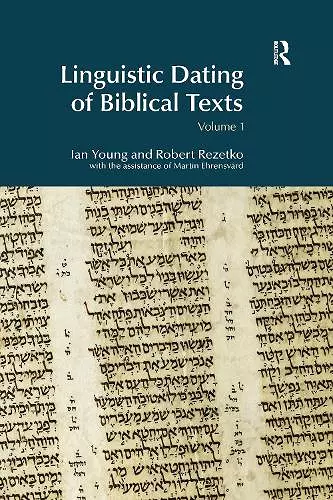Linguistic Dating of Biblical Texts
An Introduction to Approaches and Problems
Ian Young author Martin Ehrensvärd author Robert Rezetko author
Format:Set / collection
Publisher:Taylor & Francis Ltd
Published:22nd Aug '14
Currently unavailable, our supplier has not provided us a restock date

Since the beginning of critical scholarship biblical texts have been dated using linguistic evidence. Until now there has been no introduction to and comprehensive overview of the field. Volume 1 introduces the linguistic dating of biblical texts. The book examines the principles and methodology used to differentiate Archaic, Early and Late biblical Hebrew; the relationship between linguistic characteristics and linguistic chronology or historical origins; the effects of dialects and diglossia on textual criticism; and the significance of extra-biblical sources. Key text samples and their linguistic features are presented, with concrete illustrations and pointers for discussion.
'This thoughtful and ambitious book by talented authors who have broken with conventional thinking about the historical development of Biblical Hebrew promises a small revolution in many branches of biblical studies and will stimulate much new, intensive research in Biblical Hebrew linguistics and stylistics.' --Ziony Zevit, Distinguished Professor of Biblical Literature and Northwest Semitic Languages and Literatures, American Jewish University, and former editor of the journal Hebrew Studies
'A vivid debate has developed in recent years on the relation between SBH (/EBH) and LBH, and above all their chronology. For many scholars, the latter has direct implications for scholarly evaluations of the possible dating of biblical literature. Did the literati stop writing in SBH by the time they began writing in LBH? Can we date books to a pre-Persian period because they are written in EBH? Which roles do regional dialects of Hebrew play in this debate? This book not only addresses these and related questions, but consistently and as comprehensively as possible deals with methodological matters and previous studies. It brings forward new perspectives and shows readers how they apply to biblical texts. There is no doubt that this massive book makes a very substantial contribution to the scholarly discussion on EBH, LBH and linguistic dating of biblical texts. It will be widely read, cited and, of course, it will raise much debate. Moreover, it makes a contribution to both research and teaching in these areas. It is written not only for linguists, but for Hebrew Bible scholars in general including students. In sum, this is an important contribution for which the authors should be congratulated and thanked by all.' --Ehud Ben Zvi, Professor of History and Classics and Religious Studies, University of Alberta
'A vivid debate has developed in recent years on the relation between SBH (/EBH) and LBH, and above all their chronology. For many scholars, the latter has direct implications for scholarly evaluations of the possible dating of biblical literature. Did the literati stop writing in SBH by the time they began writing in LBH? Can we date books to a pre-Persian period because they are written in EBH? Which roles do regional dialects of Hebrew play in this debate? This book not only addresses these and related questions, but consistently and as comprehensively as possible deals with methodological matters and previous studies. It brings forward new perspectives and shows readers how they apply to biblical texts. There is no doubt that this massive book makes a very substantial contribution to the scholarly discussion on EBH, LBH and linguistic dating of biblical texts. It will be widely read, cited and, of course, it will raise much debate. Moreover, it makes a contribution to both research and teaching in these areas. It is written not only for linguists, but for Hebrew Bible scholars in general including students. In sum, this is an important contribution for which the authors should be congratulated and thanked by all.' --Ehud Ben Zvi, Professor of History and Classics and Religious Studies, University of Alberta
ISBN: 9781845530815
Dimensions: unknown
Weight: 530g
764 pages